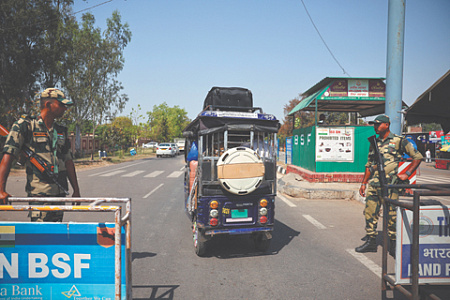
The Indian and Pakistani military engaged in a firefight. Fortunately, there were no casualties. The reason for the escalation of the situation was an attack by militants on a group of vacationers in Pahalgam, one of the most picturesque corners of the Indian part of Kashmir. 26 people died. India blamed Pakistan for the attack, but Pakistan rejected the accusation and demanded an independent investigation. Indian Prime Minister Narendra Modi promised to punish all those who staged the terrorist attack in Pahalgam.
The head of the Indian government made a radio address immediately after the Indian military reported that they had been fired upon by Pakistanis and they returned fire. It is not yet clear how the Prime Minister’s order will be implemented. But the history of India-Pakistan relations suggests that the consequences can be serious. India and Pakistan have fought three wars, the first two over Kashmir. Back in the days of British colonial rule in India, this area in the foothills of the Himalayas served as a haven of coolness and tranquility for officials and rich men against the background of the sweltering heat on the plain. Srinagar, the largest city in the region, even had a unique tourism industry. Huge boats, equipped to receive tourists, floated on the lake in the middle of the city.
However, the idyll came to an end in 1947, when Britain announced its withdrawal from India and divided the former colony into two states – India and Pakistan. The Maharaja, who ruled the principality, was a Hindu and declared it a part of India. But the vast majority of the population professed Islam. The tribal leaders organized a “militia” and launched an offensive. The Government of India, which had just declared independence, was forced to send troops to Kashmir. This is how the “border” appeared in Kashmir, more precisely, the line of actual control between the two countries. Supporters of Pakistan proclaimed “Azad Kashmir” – Free Kashmir, and the state of Jammu and Kashmir was subsequently established in India. Moreover, both Delhi and Islamabad believe that they have the right to own all of Kashmir.
In 1965, Pakistan attempted to organize an uprising in the Indian part of Kashmir. The second Indo-Pakistani war broke out, in which there was no winner. The Soviet Union played a major role in establishing peace by acting as a mediator. The reason for the third India-Pakistan war was not Kashmir, but the repression of the Pakistani military regime against the insurgents in East Pakistan (now Bangladesh). Then Pakistan was defeated.
Observers are wondering if the current tragic incident will escalate into a new war. This option cannot be ruled out. Residents of settlements located near the ceasefire line, that is, the de facto border, began to restore abandoned underground bunkers on their land plots. India has expelled some Pakistani diplomats from the country and eliminated visas issued to Pakistani citizens. Pakistan responded to this in a mirror way. India has also terminated the Indus River Waters Treaty. By order of Delhi, the floodgates were closed. As a result, Pakistan stopped receiving water from the Indus. Islamabad has threatened that it will not leave India’s move unanswered.
It should be borne in mind that the external background for the current confrontation is completely different than in the last century. During the third Pakistan-India War, the Soviet Union was a close friend of India. He supplied India with weapons. And when the fighting began in 1971, he increased the transportation of weapons and ammunition. At that time, Pakistan’s de facto ally was the United States, which defiantly sent an aircraft carrier to the shores of India as a deterrent.
Today, India is being courted by the administration of US President Donald Trump. It seeks to oust Russia from the Indian arms market and use the territorial dispute between India and China to win over Delhi. And China has become Pakistan’s main pillar in the international arena. He has established a joint arms production with Pakistan and is sending his military advisers there. A symbol of the growing informal alliance between Beijing and Islamabad was the fact that China invited Pakistanis to train for a flight to the Chinese space station Shenzhou.
It is clear that China sympathizes with Pakistan. But this does not mean that we can expect Chinese intervention in the Indian-Pakistani conflict. Beijing adheres to the line of non-participation in disputes between the countries of the global South. China considers itself its leader.
